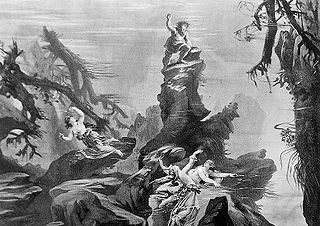
Der Ring des Nibelungen, WWV 86, is a cycle of four German-language epic music dramas composed by Richard Wagner. The works are based loosely on characters from Germanic heroic legend, namely Norse legendary sagas and the Nibelungenlied. The composer termed the cycle a "Bühnenfestspiel", structured in three days preceded by a Vorabend. It is often referred to as the Ring cycle, Wagner's Ring, or simply The Ring.

The Bayreuth Festspielhaus or Bayreuth Festival Theatre is an opera house north of Bayreuth, Germany, built by the 19th-century German composer Richard Wagner and dedicated solely to the performance of his stage works. It is the venue for the annual Bayreuth Festival, for which it was specifically conceived and built. Its official name is Richard-Wagner-Festspielhaus. It is the home of the Bayreuth Festival Orchestra.
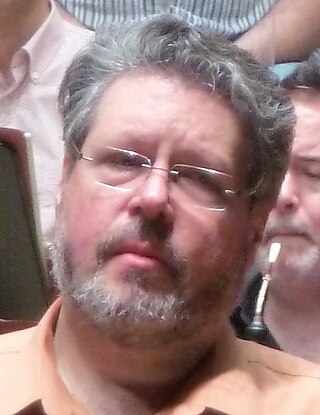
Stephen Grady Gould was an American heldentenor and leading interpreter of Richard Wagner's stage works. He performed around 100 times at the Bayreuth Festival, notably as Tannhäuser starting in 2004, and later Siegfried and Tristan. In 2022, his performance in all three roles earned him nicknames such as Iron Man.
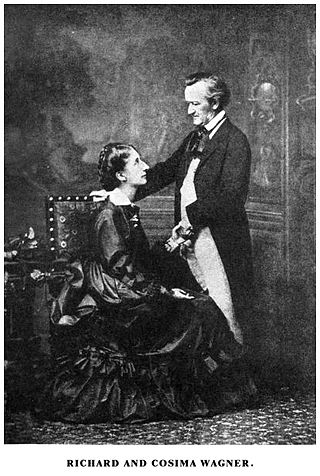
The Bayreuth canon consists of those operas by the German composer Richard Wagner (1813–1883) that have been performed at the Bayreuth Festival. The festival, which is dedicated to the staging of these works, was founded by Wagner in 1876 in the Bavarian town of Bayreuth, and has continued under the directorship of his family since his death. Although it was not originally held annually, it has taken place in July and August every year since the 75th anniversary season in 1951. Its venue is the Bayreuth Festspielhaus, which was built for the first festival. Attendance at the festival is often thought of as a pilgrimage made by Wagner aficionados.

The Nordwestdeutsche Philharmonie is a German symphony orchestra based in Herford. Founded in 1950, the orchestra is one of the Landesorchester of the state of North Rhine-Westphalia, along with the Philharmonie Südwestfalen and the Landesjugendorchester NRW. The orchestra is funded partly by the state of North Rhine-Westphalia and an association of communities in the region Ostwestfalen-Lippe. Members of the association are the cities Bad Salzuflen, Bünde, Detmold, Herford, Lemgo, Minden and Paderborn and the districts Herford und Lippe. The orchestra gives concerts in such venues as the Konzerthalle Bad Salzuflen and the Stadttheater Minden.

Stadttheater Minden is a municipal theatre in Minden, North Rhine-Westphalia, Germany. The theatre has no ensemble, but stages some productions of its own. It became known for a Wagner project culminating in Der Ring in Minden.
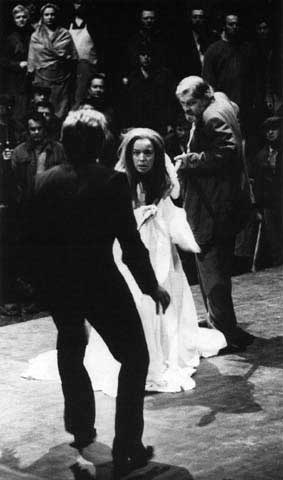
The Jahrhundertring was the production of Richard Wagner's Ring cycle, Der Ring des Nibelungen, at the Bayreuth Festival in 1976, celebrating the centenary of both the festival and the first performance of the complete cycle. The festival was directed by Wolfgang Wagner and the production was created by the French team of conductor Pierre Boulez, stage director Patrice Chéreau, stage designer Richard Peduzzi, costume designer Jacques Schmidt and lighting designer André Diot. The cycle was shown first in 1976, then in the following years until 1980. It was filmed for television in 1979 and 1980. While the first performance caused "a near-riot" for its brash modernity, the staging established a standard, termed Regietheater, for later productions.
Petra Lang is a German opera singer. Beginning as a mezzo-soprano, from 2012 a soprano, she is known for her interpretation of music by Richard Wagner and Gustav Mahler. She made an international career in both opera and concert. She has performed at the Bayreuth Festival from 2005, singing the title role of Isolde in 2016.
Elisabeth Eleonore Büning is a German music journalist and writer, known for her opera reviews in the Frankfurter Allgemeine Zeitung.

Andreas Schager is an Austrian operatic tenor. He began his career as a tenor for operettas, but has developed into singing Heldentenor parts by Richard Wagner including Tristan, Siegmund, Siegfried and Parsifal. A member of the Staatsoper Berlin, he has appeared internationally at venues including La Scala, The Proms and the Bayreuth Festival.
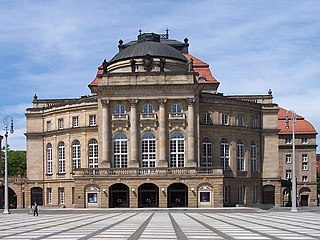
Frank Beermann is a German conductor. He was Generalmusikdirektor (GMD) at the Chemnitz Opera for several years, and has worked freelance at international opera houses from 2012. He has conducted premieres and recordings of rarely performed operas and orchestral works.
Dara Kristin Hobbs is an American operatic soprano, who has appeared internationally, mostly in European opera houses. Her repertoire has focused on dramatic soprano roles, such as Wagner's Isolde and Strauss' Ariadne. She appeared as Wagner's Brünnhilde in Der Ring in Minden.
Matthias von Stegmann is a German actor, voice-over speaker and writer, author and stage director for theatre and especially opera who works internationally. He wrote dialogue and directed it for German versions of American series such The Simpsons. In opera, he has focused on the work of Richard Wagner. He staged a version of his Der Ring des Nibelungen for children, first in Tokyo, then in German at the Vienna State Opera and in Zurich. He staged in 2012 Tristan und Isolde in Minden, and in 2013 the first performance of Rienzi at the Bayreuth Festival.

Der Ring in Minden was a project to stage Richard Wagner's cycle Der Ring des Nibelungen at the Stadttheater Minden, beginning in 2015 with Das Rheingold, followed by the other parts in the succeeding years, and culminating with the complete cycle performed twice in 2019. The stage director was Gerd Heinz, and Frank Beermann conducted the Nordwestdeutsche Philharmonie, playing on the stage of the small theatre. The singers acted in front of the orchestra, making an intimate approach to the dramatic situations possible. The project received international recognition and was compared favourably to the Bayreuth Festival.
Thomas Mohr is a German operatic tenor and academic voice teacher. He began his career as a baritone, but moved on to heldentenor and has performed roles in all tenor parts of Wagner's Der Ring des Nibelungen at Der Ring in Minden. He has appeared at major international opera houses and concert halls, and made recordings. Mohr is a professor of voice at the Hochschule für Künste Bremen. He also runs an agricultural estate where he founded a music festival.
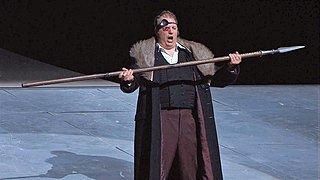
Renatus Mészár is a German operatic bass who has performed leading roles such as Wotan in Wagner's Der Ring des Nibelungen at major opera houses and festivals. Now a member of the Badisches Staatstheater Karlsruhe, he appeared in the world premiere of Avner Dorman's Wahnfried and the first recording of Bruno Maderna's Requiem.
Kathrin Göring is a German operatic mezzo-soprano, a member of the Oper Leipzig who has appeared at other major opera houses, also in concert and recital, and made recordings. She has appeared in Leipzig in leading roles such as Bizet's Carmen and Wagner's Parsifal. She sang both Fricka and Waltraute in Der Ring in Minden.
Tijl Faveyts is a Belgian operatic bass. A current member of the Komische Oper Berlin, he has performed leading roles such as Mozart's Sarastro and Hunding in Wagner's Die Walküre and Gurnemanz Parsifal at major opera houses, concert halls and festivals, and made recordings.
Heiko Trinsinger is a German operatic baritone. A member of the Aalto Theatre in Essen, he has performed leading roles at major houses, such as Mozart's Papageno and Wagner's Alberich.
Julia Bauer is a German operatic coloratura soprano who has appeared at major opera houses and also in concert and recital. She has had leading roles such as Zerbinetta and Lulu, and was Freia, Helmwige, Forest Bird, Woglinde and Third Norn in Der Ring in Minden.










